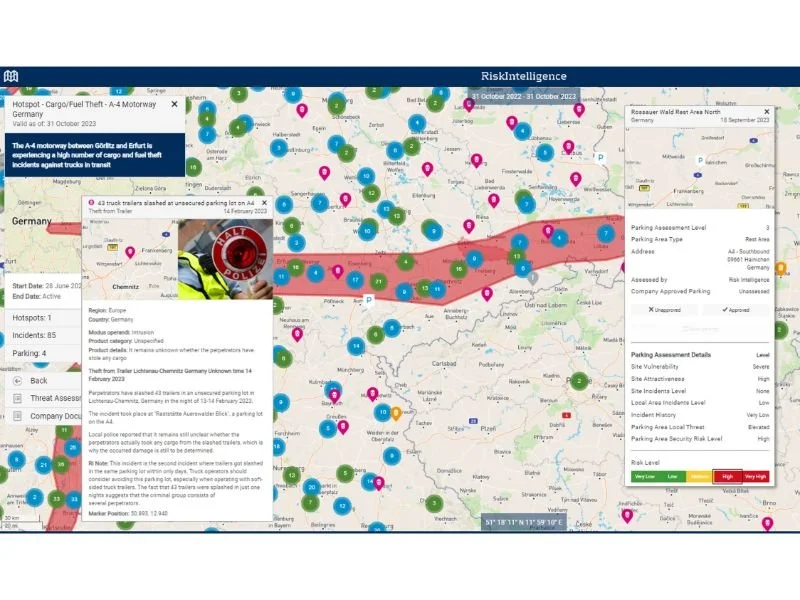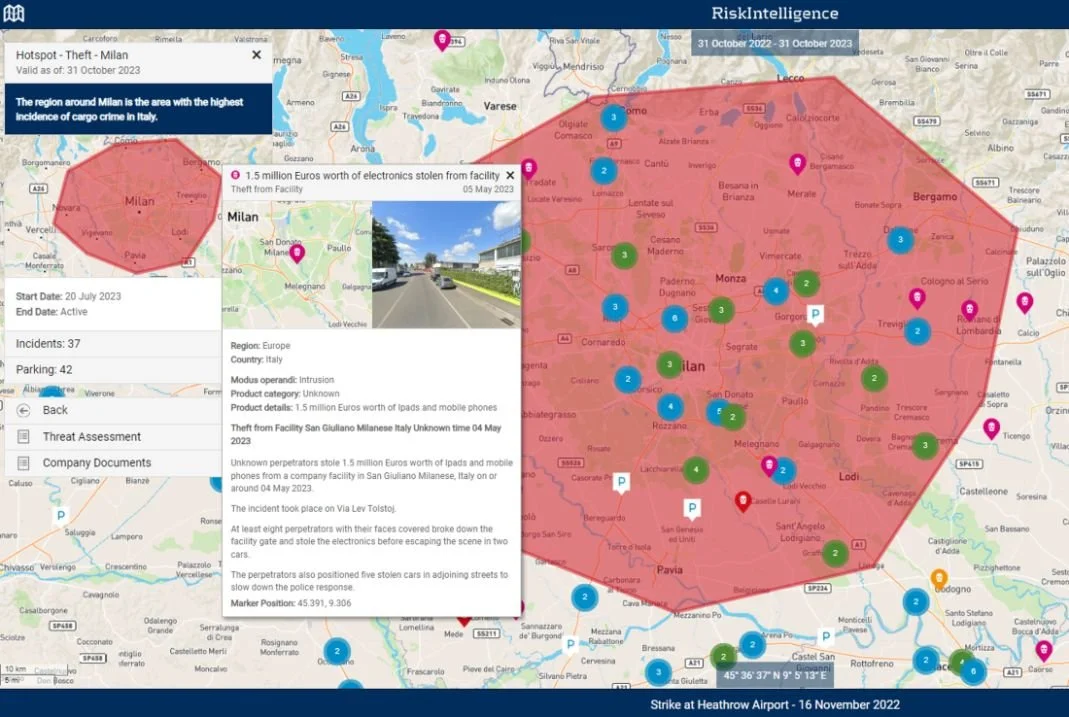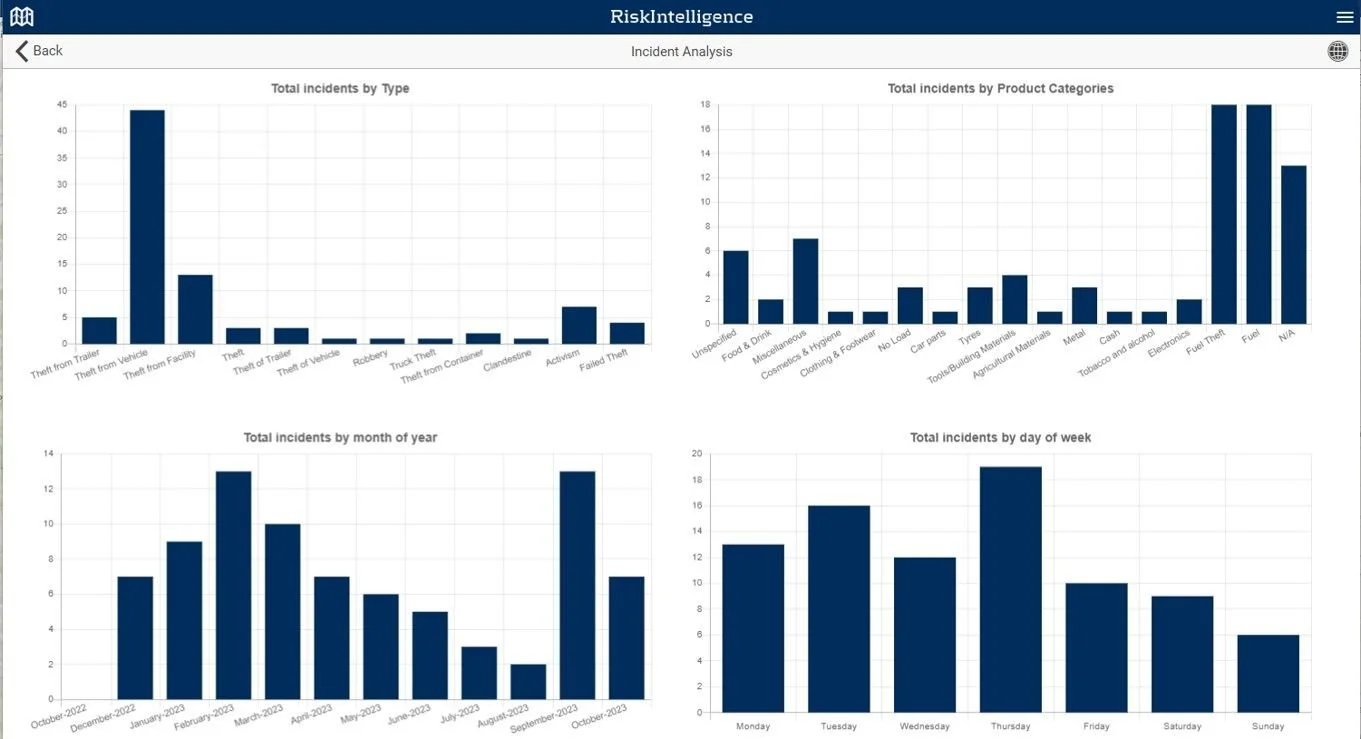Reducing supply chain risks at cargo crime ‘Hotspots’
Jeanne Albin, LandRisk Security Specialist and Steve Bacot, LandRisk Manager recently contributed to TAPA EMEA with an article highlighting the importance of cargo theft crimes, which continue to pose a significant threat to the global supply chain.
23 November 2023
Cargo theft is a major concern for global supply chains as it has the potential to greatly impact companies' reputations and financial performance. The industry is working to address this by developing preventive technologies, establishing security standards, and increasing awareness. Limited security budgets and a lack of secure truck parking can pose obstacles to progress. Intelligence plays a crucial role in addressing this gap by offering valuable resources such as incident data, real-time updates on areas prone to cargo theft, and analysis of vulnerabilities in specific truck parking areas. Understanding local threats and the motivations behind them can help in implementing cost-effective measures to mitigate these threats.
According to LandRisk Logistics, the type, characteristics, and impact of incidents, along with the motivations and methods of operation of cargo theft criminals, differ across Europe. The article highlights two prominent hotspots for cargo theft in Europe, aiming to illustrate the ever-changing threat landscape and emphasize the significance of staying updated on recent developments.
Hotspot – Germany, A4
The A-4 motorway, between Görlitz and Erfurt, has experienced a significant increase in cargo crime activity in recent months. According to LandRisk Logistics, there have been a total of 95 incidents reported between November 2022 and November 2023.
The Görlitz-Erfurt corridor has been plagued by cargo theft incidents, with the western part of the route being the most targeted. Most thefts occur when trucks are parked overnight at non-secure parking areas. These areas are often unlit and less vulnerable to detection. During the past twelve months, there was only one recorded robbery, but it is worth noting that the driver was physically assaulted during the incident. In this area, criminals primarily employed two methods: tarpaulin slashing and forced entry, which require limited resources and effort.
Implementing intelligence-led risk management can effectively mitigate common risks, including deterrence, detection, and response measures. To avoid becoming an easy target in non-secure parking areas, operators can take measures such as installing hard-sided trailers or trailer alarm systems. The use of robust locks provided by TAPA premiere partners can effectively deter criminals from targeting a truck. Trailer alarms and cargo tracking devices can be helpful in recovering breached hard-sided trailers, which can potentially minimise the impact of such incidents.
Hotspot – Milan
In Milan’s hotspot area, facility theft is the most common type of incidents (41%). Although, thefts from vehicles ranked second, the majority of these incidents occurred in industrial estates, with targeted trucks often parked within or in front of facility premises.
There has been an increase in organised criminal groups (OCGs) targeting trucks and facilities in industrial areas in the Milan hotspot. The threat in Milan is different from Germany in several ways. One notable difference is that most incidents in Milan tend to occur near or during weekends. Additionally, there is a shortage of facility staff and public truck drivers in Milan, which makes it more challenging to deter criminals.
To effectively reduce the risk of theft, it is important to customise mitigation measures according to the specific threat. One way to achieve this is by implementing TAPA FSR protocols. Operating in Milan, OCGs have the ability to swiftly and effectively carry out their operations. They are skilled at infiltrating facilities, fully aware that an alarm may be triggered, and are able to escape before law enforcement can respond. It is recommended that facility operators conduct a thorough evaluation of their incident response strategies. Additionally, they should use intelligence to identify secure parking areas and prioritise the completion of hazardous routes in daylight to arrive closer to designated delivery times.
The discussed risk controls have the objective of minimising risk, with a strong emphasis on cost-effectiveness. Operators have the ability to address criminal activities in areas where there is a lack of support for TSR or PSR standards.
One effective approach is to focus on secure parking, as this can help to minimise the risk of cargo theft. Even if the business model doesn't support these measures, it is still possible to implement this proactive approach.
Read the full article on TAPA EMEA's page.
LEARN MORE:
Want 24/7 access to unrivalled intelligence? You can keep up to date with the latest cargo theft incidents and other threats that may disrupt the supply chain with LandRisk Logistics:
With Risk Intelligence's LandRisk Logistics you can optimise your risk management and significantly improve your ability to find secure alternative routes when a threat goes up. Get a trial on how integrating route planning, risk assessment and threat alerts in one system can help you to identify the ideal route for your commercial operations.




